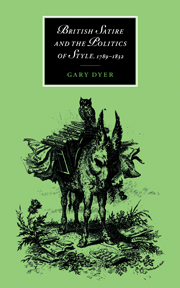Book contents
- Frontmatter
- Contents
- Acknowledgments
- Note on the text
- Introduction
- 1 The scope of satire, 1789–1832
- 2 The modes of satire and the politics of style
- 3 The meaning of Radical verse satire
- 4 Peacock, Disraeli, and the satirical prose narrative
- 5 Satire displaced, satire domesticated
- Notes
- Works cited
- A select bibliography of British satirical verse, 1789–1832
- Index
- Cambridge Studies in Romanticism
5 - Satire displaced, satire domesticated
Published online by Cambridge University Press: 02 December 2009
- Frontmatter
- Contents
- Acknowledgments
- Note on the text
- Introduction
- 1 The scope of satire, 1789–1832
- 2 The modes of satire and the politics of style
- 3 The meaning of Radical verse satire
- 4 Peacock, Disraeli, and the satirical prose narrative
- 5 Satire displaced, satire domesticated
- Notes
- Works cited
- A select bibliography of British satirical verse, 1789–1832
- Index
- Cambridge Studies in Romanticism
Summary
The puns are nine in ten good – many excellent – the Newgatory transcendent. And then the exemplum sine exemplo of a volume of personalities and contemporaneities, without a single line that could inflict the infinitesimal of an unpleasance on any man in his senses.
Coleridge, praising John Hamilton Reynolds and Thomas Hood's Odes and Addresses to Great People (1825)In our own day we have plenty of Satire in our literature. But, for the most part, Satire does not bloom independently as a plant; it enters into the composition of literary productions, and gives a tone to them. We have not the satiric laurel; but then it flavors puddings and blanc-mange, and is to be tasted in various liqueurs. We have novelists, and essayists, and journalists, who are satirical; but where is our Satirist?
James Hannay, in Satire and Satirists (1853)In the 1820s and 1830s satire largely disappeared as a distinct literary form or distinct group of forms, and several factors bear responsibility: publishers needed the reliable profits fiction provided; many in the literary world assumed that satire, like poetry in general, was passe now that Byron was dead; and the public's desire to reevaluate their political and social institutions entailed a preference for “realistic” discursive forms like the treatise or the lecture over “imaginative” ones like satire. Moreover, another force was transforming satire, although indeed over a longer time span: the increasingly dominant ideologies characteristic of the middle classes, which in practical terms include those of the Nonconforming denominations and the Evangelical branch of Anglicanism, all restrained verbal attack and, along with it, satire.
- Type
- Chapter
- Information
- British Satire and the Politics of Style, 1789–1832 , pp. 139 - 167Publisher: Cambridge University PressPrint publication year: 1997



